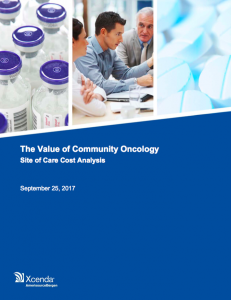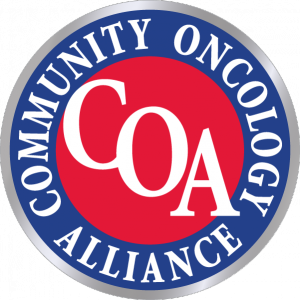Study: Cancer Care Delivered In Hospital Outpatient Setting Much More Expensive Than in Community Oncology Practices
Chemotherapy 71% More Expensive, Physician Visits 333% More Expensive, and Patients Have Higher Rates of ED Visits When Treated in Hospital Outpatient Setting
The study, “The Value of Community Oncology: Site of Care Cost Analysis” was conducted by Lucio Gordan, MD, Medical Director in the Division of Quality & Informatics at Florida Cancer Specialists & Research Institute, and Xcenda, a global health economics consultancy. It was released today by the Community Oncology Alliance (COA).
Across all cancers, the analysis demonstrated that total cost of care for a patient receiving chemotherapy within the hospital outpatient setting was 59.9% higher, or $7,512, more expensive per month than for those patients treated in the community practices ($20,060 vs. $12,548). The biggest drivers for the cost differential were the cost of chemotherapy which was 71% higher, or $3,510, more expensive per month in the hospital setting ($8,443 vs. $4,933), and the cost of physician visits, which were 333% higher, or $2,551, more expensive in the hospital setting than in the community practices ($3,316 vs. $765).
The analysis also found that rates of ED visits by cancer patients following chemotherapy were also higher in the hospital outpatient setting than the community practices. Within 72 hours of chemotherapy they were nearly 40% higher in the hospital setting (3.6% vs. 2.6%), and within 10 days of chemotherapy they were 24% higher in the hospital setting (9.8% vs. 7.9%).
The report looked at specific data for total cost differentials by type of cancer for breast, lung, and colorectal cancer patients. The data was consistent in showing that costs for these cancers were significantly higher for cancer care delivered in the hospital outpatient setting than in the community practices. Specifically, the researchers found that for:
• Breast cancer, the total cost of care was 66% higher, or $7,680, more per month higher in the hospital setting than in the community setting;
• Lung cancer, the total cost of care was 54% higher, or $9,414, more per month in the hospital setting than the community setting; and
• Colorectal cancer, the total cost of care was 46% higher, or $7,264, more per month in the hospital setting than the community setting.
The higher costs of cancer care in the hospital outpatient setting appear to be primarily driven by the increased cost of both chemotherapy and physician visits. The results were maintained regardless of whether a branded, generic, or combination of brand and generic chemotherapy drugs were used.
“As a physician, I am constantly concerned about the financial toxicity of cancer care. It is disappointing again to see data that hospital-based cancer care is considerably more expensive than the community practices. While, at the same time, more patients are being forced into hospitals,” said Dr. Gordan. “Providers, payers, policymakers, and patients need to take a long hard look at the impact that site of care has on cancer patients, not just in terms of the cost, but also outcomes, quality of care, and satisfaction. It is clear that the community oncology setting should be the preferred, first choice treatment setting for cancer patients.”
The findings of this study were consistent with at least 10 previous studies between 2011 and 2016 that found the average cost of cancer care was 38% higher for patients treated in hospital outpatient settings compared with those treated in the community practices. This new study expands upon the cost differential findings of multiple previous studies and examined if cost differentials between hospital setting and the community oncology practices still exist when disparities in patient profiles were minimized.
The study found the cost differential based on site of care delivery particularly concerning because of the decrease in access to community oncology practices with a corresponding increase in hospital acquisition of community oncology practices. Per COA’s 2016 Community Oncology Practice Impact Report, 1,146 independent, community oncology practices have closed, merged or been acquired, or been purchased by hospitals since 2008.
One of the primary reasons for the shift of cancer care into the hospital outpatient setting is the 340B Drug Discount Program, which requires drug manufacturers to provide outpatient drugs at significantly reduced prices to eligible health care organizations that are supposed to treat high numbers of indigent and uninsured patients. COA found that in 2014 and 2015, 74.5% of the acquisitions of community oncology clinics were by hospitals with 340B drug discount pricing.
“More than a decade of data have consistently shown that hospitals are a tremendous driver of excessive spending on cancer care,” said Ted Okon, executive director of COA. “Congress and the administration need to step forward and address this by reining in abuses of the 340B program and implementing site payment parity. It is crazy that our country continues to push more and more cancer care into the much more expensive hospital setting as we seek ways to reduce runaway health care spending.”
The full study “The Value of Community Oncology: Site of Care Cost Analysis” is available online at https://www.communityoncology.org/wp-content/uploads/2017/09/Site-of-Care-Cost-Analysis-White-Paper_9.25.17.pdf.
###
About the Community Oncology Alliance
The Community Oncology Alliance (COA) is a non-profit organization dedicated solely to preserving and protecting access to community cancer care, where most Americans with cancer are treated. COA leads community cancer clinics in navigating an increasingly challenging environment to provide efficiencies, patient advocacy, and proactive solutions to Congress and policy makers. To learn more about COA visit www.CommunityOncology.org.
About Florida Cancer Specialists & Research Institute
Florida Cancer Specialists & Research Institute (FCS) is the largest independent medical oncology/hematology practice in the United States. With more than 200 physicians, 160 nurse practitioners and physician assistants and 100 locations in our network, FCS is committed to providing world-class cancer care in community-based settings close to home. To learn more about FCS visit www.FLCancer.com.
Nicolas Ferreyros
Community Oncology Alliance
6466854262
email us here
Legal Disclaimer:
EIN Presswire provides this news content "as is" without warranty of any kind. We do not accept any responsibility or liability for the accuracy, content, images, videos, licenses, completeness, legality, or reliability of the information contained in this article. If you have any complaints or copyright issues related to this article, kindly contact the author above.


